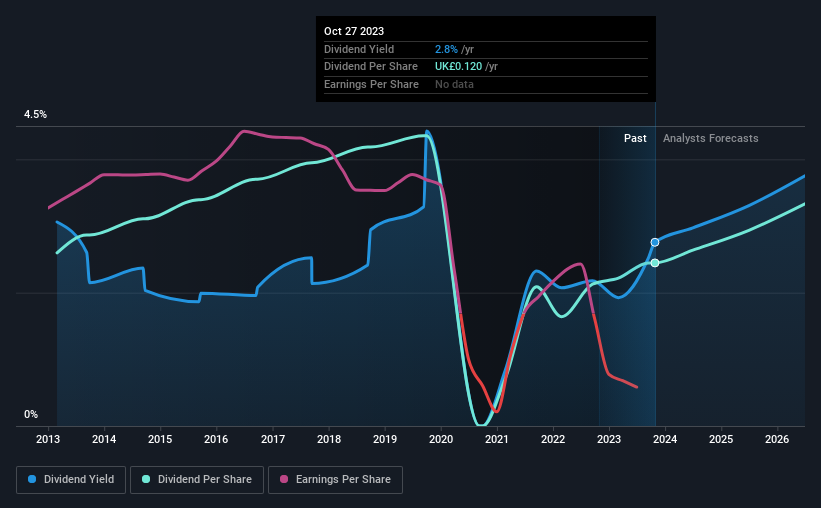Here's Why We're Wary Of Buying Ricardo's (LON:RCDO) For Its Upcoming Dividend
Ricardo plc (LON:RCDO) is about to trade ex-dividend in the next four days. The ex-dividend date occurs one day before the record date which is the day on which shareholders need to be on the company's books in order to receive a dividend. The ex-dividend date is of consequence because whenever a stock is bought or sold, the trade takes at least two business day to settle. Therefore, if you purchase Ricardo's shares on or after the 2nd of November, you won't be eligible to receive the dividend, when it is paid on the 24th of November.
The company's upcoming dividend is UK£0.086 a share, following on from the last 12 months, when the company distributed a total of UK£0.12 per share to shareholders. Based on the last year's worth of payments, Ricardo has a trailing yield of 2.8% on the current stock price of £4.34. We love seeing companies pay a dividend, but it's also important to be sure that laying the golden eggs isn't going to kill our golden goose! As a result, readers should always check whether Ricardo has been able to grow its dividends, or if the dividend might be cut.
Check out our latest analysis for Ricardo
Dividends are typically paid from company earnings. If a company pays more in dividends than it earned in profit, then the dividend could be unsustainable. Ricardo paid a dividend last year despite being unprofitable. This might be a one-off event, but it's not a sustainable state of affairs in the long run. Given that the company reported a loss last year, we now need to see if it generated enough free cash flow to fund the dividend. If Ricardo didn't generate enough cash to pay the dividend, then it must have either paid from cash in the bank or by borrowing money, neither of which is sustainable in the long term. Ricardo paid out more free cash flow than it generated - 191%, to be precise - last year, which we think is concerningly high. It's hard to consistently pay out more cash than you generate without either borrowing or using company cash, so we'd wonder how the company justifies this payout level.
Click here to see the company's payout ratio, plus analyst estimates of its future dividends.
Have Earnings And Dividends Been Growing?
When earnings decline, dividend companies become much harder to analyse and own safely. If earnings fall far enough, the company could be forced to cut its dividend. Ricardo reported a loss last year, and the general trend suggests its earnings have also been declining in recent years, making us wonder if the dividend is at risk.
Another key way to measure a company's dividend prospects is by measuring its historical rate of dividend growth. Ricardo has seen its dividend decline 0.6% per annum on average over the past 10 years, which is not great to see.
Remember, you can always get a snapshot of Ricardo's financial health, by checking our visualisation of its financial health, here.
Final Takeaway
Has Ricardo got what it takes to maintain its dividend payments? It's hard to get used to Ricardo paying a dividend despite reporting a loss over the past year. Worse, the dividend was not well covered by cash flow. Bottom line: Ricardo has some unfortunate characteristics that we think could lead to sub-optimal outcomes for dividend investors.
Having said that, if you're looking at this stock without much concern for the dividend, you should still be familiar of the risks involved with Ricardo. Case in point: We've spotted 1 warning sign for Ricardo you should be aware of.
A common investing mistake is buying the first interesting stock you see. Here you can find a full list of high-yield dividend stocks.
Have feedback on this article? Concerned about the content? Get in touch with us directly. Alternatively, email editorial-team (at) simplywallst.com.
This article by Simply Wall St is general in nature. We provide commentary based on historical data and analyst forecasts only using an unbiased methodology and our articles are not intended to be financial advice. It does not constitute a recommendation to buy or sell any stock, and does not take account of your objectives, or your financial situation. We aim to bring you long-term focused analysis driven by fundamental data. Note that our analysis may not factor in the latest price-sensitive company announcements or qualitative material. Simply Wall St has no position in any stocks mentioned.

